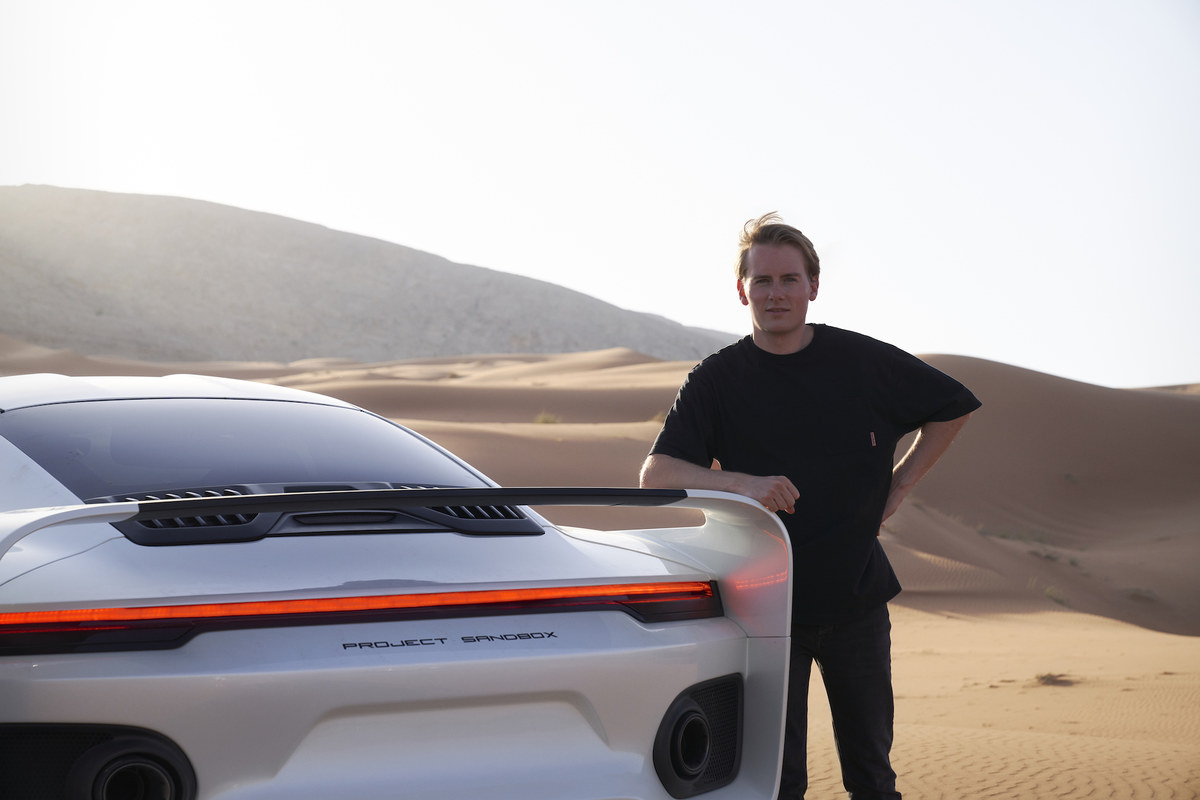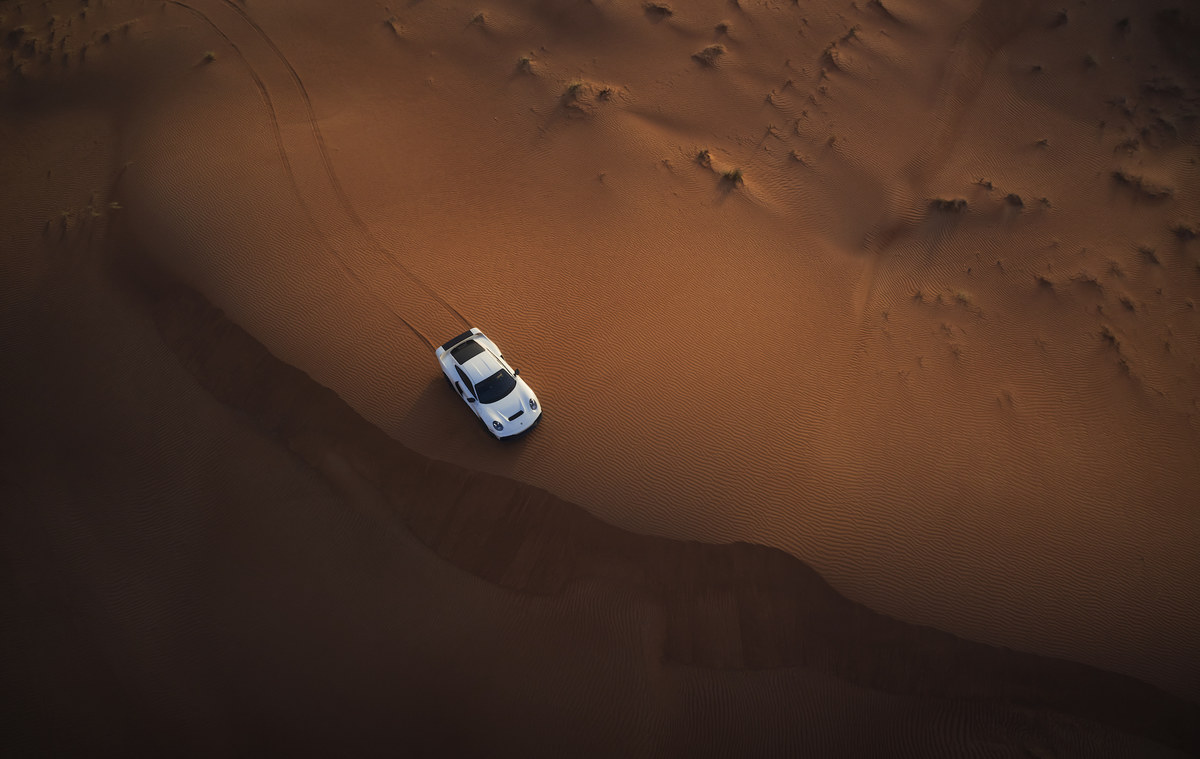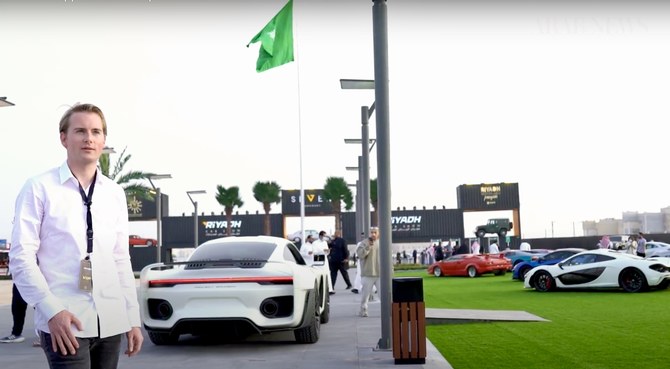RIYADH: A Porsche-inspired off-roader called the Marsien stole the hearts of car enthusiasts at the Riyadh Car Show, as it debuted for the first time in the Kingdom.
Known as Project Sandbox while under testing, the bespoke Marsien by Marc Philipp Gemballa shook the world with its surreal promises and design when it first launched in 2021, offering only 40 cars on completion.
“A lot of people have been waiting to see the Marsien and this is the first time some of our clients here in Saudi Arabia are seeing it in person,” said Gemballa. “The Riyadh Car Show has been put together so well. We are extremely happy to be among the international group of manufacturers here.”

Marc Philipp Gemballa, 27-year old founder of MARC PHILIPP GEMBALLA GmbH, standing next to the Marsien in Al-Faya desert in Sharjah, UAE. (Supplied)
Arab News had the opportunity to meet with 27-year-old entrepreneur, the son of celebrated German car tuner Uwe Gemballa, who shared his insights into what inspired the creation of the Marsien.
“Growing up around Porsches, there was always a special connection and so it was pretty clear to us that we would use Porsche as a platform, but that alone wasn’t going to be enough,” he said.
Philipp Gemballa realized he needed something special in a radically changing supercar industry; the fastest and most powerful vehicles were not going to cut it anymore. It was time for something that would shock the world and deliver the ultimate driving experience.
After 12 weeks of testing in the Al-Faya red desert sands in Sharjah, the Marsien was born.

The MARC PHILIPP GEMBALLA Marsien seen dune-bashing in Al-Faya desert in Sharjah, UAE. (Supplied)
With the touch of a button, a hydraulic suspension lift system gives the car 25 cm of ground clearance, making it a formidable candidate for desert duning and taking up ski slopes, something no ordinary supercar can do.
“There’s no category yet that the Marsien fits in, so it kind of redefines the term supercar,” the German tuner said. “I think that people are looking for a pure driving experience and I want to be the one who delivers them that.”
Inspired by the legendary Paris Dakar rally era, the ethos Philipp Gemballa applied when designing the Marsien was ultramodern, yet timeless. Featuring a full carbon fiber body, the off-roading Marsien was designed for performance to become the ultimate adventure sports car.
“The inspiration came from wanting to create something special, something unique, something that’s not comparable to any type of car out there,” he said. “When I started the project, there were a lot of new hypercars coming out with high performance figures and I realized that I didn’t want to create another imitator product. And so we thought, why not do the extreme from on-road to off-road and create the first (Porsche) 911 that you can take off-roading?”

The interior of the Marsien, or Project Sandbox, with the MARC PHILIPP GEMBALLA logo embossed on the steering wheel. (Supplied)
To create the ultimate driver experience, Philipp Gemballa decided to team up with specialists and renowned automotive companies, including leading performance exhaust manufacturer Akrapovic, suspension pioneer KW Automotive and Porsche engine specialist and vehicle manufacturer RUF Automobile.
Underneath the bonnet is a 3.7 liter twin-turbo charged six cylinder engine, pushing out 750 horsepower. It boasts 0-100 km per hour in just 2.6 seconds with a top speed of 330 km per hour.
Gemballa added: “If there are clients that would like to have even more power, we can take it up to 830 horsepower.”
The name of the car, Marsien, is derived from the word “martian,” because when testing in the UAE, the car looked like it was on the surface of Mars.

An aerial short of the MARC PHILIPP GEMBALLA Marsien in Al-Faya desert in Sharjah, UAE looks like the car is on the surface of Mars. (Supplied)
Now at 60 percent completion, first deliveries are expected in spring 2022 with all remaining cars promised to be delivered before the end of 2023.
“At this point, we are in the process of preparing for the serial production. Now we’re doing the final tuning for the homologation process, as well as small design updates to perfect the production quality.”
Philipp Gemballa has been working on the Marsien since before the latest 911 Turbo was actually on sale. The first test mules were based on a standard 911 Carrera 4S.
Due to its limited production, only a few pieces remain which will go to strategic clients, he said. They will first have to order a 992 Porsche 911 Turbo S in the specifications Philipp Gemballa requests, after which the German tuning company will be able convert it into the off-roading machine for €495,000 ($557,276).
Philipp Gemballa justifies the high price with the uniqueness of the product, as well as its limited production and exclusivity, saying there is “nothing like it.”
Located north of Riyadh, the Riyadh Car show is open to the public displaying over 600 of the most exotic and rare automobiles in one venue for all eyes to see.
Entry tickets for the show cost SR150 ($40) and will be running until Nov. 28, opening its doors from 4 p.m. until 11 p.m.



































